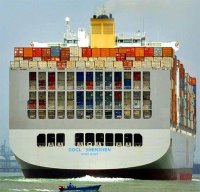The Weekend of Missed Deadlines
 This seems to be the weekend of the missed deadlines. The absence of the expected good news has possible opened the door for bad news further ahead.
This seems to be the weekend of the missed deadlines. The absence of the expected good news has possible opened the door for bad news further ahead.Three important deadlines have been missed. For the Doha Developments Talks. For the Darfur peace process. And for hand-over of Radko Mladko to the UN Tribunal.
Some words about the first topic – there will be reason to return to the other two.
It was in Hong Kong in December that the 140 nations of WTO set this weekend as the deadline for further progress towards a global trade deal.
The benefits from such a deal would be substantial.
There is talk of scrapping nearly all the barriers faced by exporters from at least 32 of the world's poorest nations and to eliminate the export subsidies that help farmers from rich countries compete unfairly against poor ones.
Such concessions, along with the faster global growth generated by cuts in barriers faced by rich and middle-income countries, would lift perhaps 10 million people above the $2-a-day income line over the next decade, judging from scenarios constructed by the World Bank.
Meanwhile, we in the richer countries would gain also: from expanded opportunities for exporters; from cheaper imports for consumers; and from the obligation to trim trade-distorting farm subsidies that damage the environment and waste taxpayer dollars and euros.
But there was no breakthrough over the weekend.
One reason is that the US is without a Trade Representative for some weeks due to the previous one being moved up to take care of the federal budget and the new one not yet confirmed by the Senate. The world has to wait.
Another is a slight war of words across the Atlantic, with a tendency in the US to blame most things on European reluctance to go sufficiently far in the cutting of far subsidies.
But that’s not really the full story, as Commission President Barroso pointed out in his remarks to the Brussels Forum the day before yesterday.
He pointed out that the EU was ready to agree to a 70 percent reduction of trade restrictions and farm support if United States comes near to matching this, and that it has also agreed to eliminate completely all export subsidies if everyone else takes similar steps.
“On top of that we have agreed to cut into our real farm tariffs by 47 percent. In CAP - Common Agricultural Policy - terms this is a small revolution and far more than the European Union has ever offered before.”
It has to be said that Europe is doing somewhat better than it is often given credit for on these issues.
But meanwhile, there is no clarity from the US side concerning its intentions with its extensive far support system. Without a Trade Representative in Place, and with Congressional elections in November, the possibility of such clarity coming up is unfortunately receding rather fast.
Bad for everyone.


<< Home